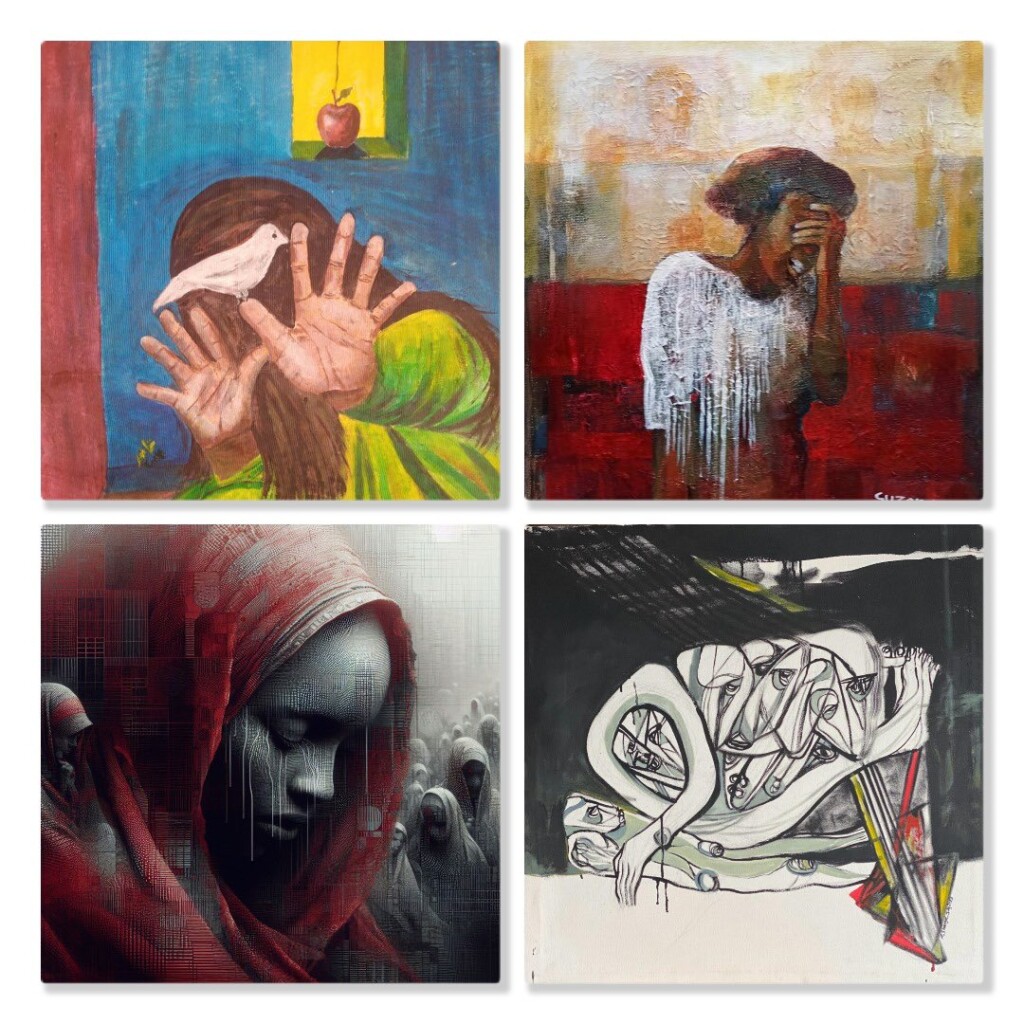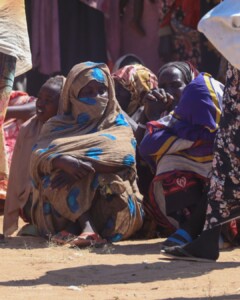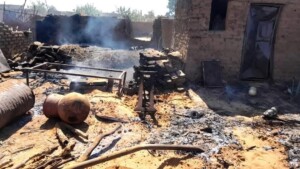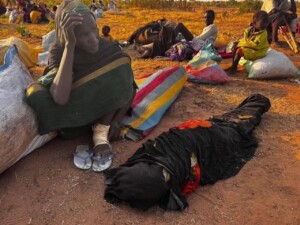More rapes recorded in Sudan, ‘authorities should show flexibility with Form 8’

Drawings and paintings about rape and sexual violence in Sudan (Image: Sudanese Together Against Rape and Sexual Violence Campaign)
The Sudanese Together Against Rape and Sexual Violence Campaign reported 81 rape cases in the country between December 15 and February 29. One third of the victims are minors. According to jurists, the authorities must be flexible in dealing with rape cases.
The Together Against Rape and Sexual Violence Campaign said in its report posted on its Facebook page on Monday that 43 per cent of the rape cases were documented in El Gezira, 27 per cent in Central Darfur, 13 per cent in White Nile state, 11 per cent in North Darfur, and six per cent in Khartoum. 32 per cent of all the victims are minors.
The report said that “the tragic reality” in Sudan confirms an increase in rape cases with the escalation of the conflict in Sudan” and stressed that “stopping the war remains a top priority, as violence and conflict can be considered the main reasons behind the worsening human rights conditions in the war-affected areas.
“Providing medical, psychological, legal, and community support is essential to reduce this horrific phenomenon and help victims recover and achieve justice.”
The campaign, which officially launched its work from Khartoum in January, earlier issued two reports on sexual violence in Sudan’s war-affected regions – most of which are or have been under control of the Rapid Support Forces (RSF).
In in its first report, on the period from April 15 to December 31, the campaign said it had documented 189 cases in six states. 185 of the victims were female, four were male. Their ages range between 11 and 45 years. 46 per cent were minors, and 42 per cent are between 18 and 34 years old.
Between December 15 to February 5, 56 rapes were registered: 53 women and three men. Minors constituted 25 per cent of the victims. Wad Madani, capital of El Gezira, recorded the highest percentage of cases, 48 per cent. North Darfur recorded 34 per cent of the cases and Khartoum 12 per cent.
In June last year, two months after fighting erupted between the Sudanese Armed Forces (SAF) and the paramilitary Rapid Support Forces (RSF), the Combating Violence Against Women Unit of the Sudanese Ministry of Social Affairs stated that the rapes documented by the unit likely represent only two per cent of the total number of cases of sexual violence.
Weapon of war
Sahal El Amin, professor of law at El Nilein University, laments that the Sudanese Penal Code “does not live up to its level of heinousness” and should not only be punished with imprisonment but also with the death penalty.
She told Radio Dabanga correspondent Abdelmonim Madibbo that “the crime of rape has become a feature of Sudan’s wars, with women, men, and children and as victims.
“Women are used in this war between the army and the RSF as weapons. They are subjected to rape, captivity, sale, and forced displacement. In particular rape of women and girls is used to degrade the other party, make them fear for losing their honour, his women, and his sanctity,” she said, “And as long as this crime is used within the framework of this concept, there must be more measures dealing with this crime than those mentioned in the law.”
Wasted rights
Sudan’s Penal Code Article 135 allows the abortion of a pregnancy resulting from rape if it does not exceed 90 days. “In light of the ongoing war, however, there must be flexibility in dealing with pregnancy cases,” El Amin said.
“According to the health protocols, medicines against pregnancy and sexually transmitted diseases [STD] are given to the victim immediately after the rape, but this may not be attainable is most cases during the war. So, rape victims may be exposed to forced pregnancy and STD, especially as they may not easily find medical aid. In addition, they are stripped of their legal rights because of the absence of police, prosecutors, and courts.
“Article 139 stipulates that that a raped woman must obtain Form 8* from the relevant authorities to be able to be treated. We wonder where one can get such a form during the war, as there are almost no hospitals and police stations operating.”
The professor demanded “this form to be skipped at the present time” and said that the Together Against Rape Campaignsent a memorandum to the public prosecutor requesting “these futile legal procedures be bypassed, especially with regard to Form 8, so that raped women can obtain their rights in the current critical security conditions”.
Modes of proof
She added that “proving a crime of rape is difficult in Sudan because it is linked to the Sharia (Islamic law). If the victim fails to prove the crime, she may become accused of adultery, according to the modes of proof stipulated in Sudanese law.
“Also here, the authorities must show flexibility an allow the use of modern methods like DNA tests to prove rape. This does not require witnesses. In addition, the testimony of the woman herself must have greater weight than what is available now. The circumstances and location in which the crime was committed, and its location must also be considered. Putting all burden on the victim who has to present witnesses, who may not be available during the war, to prove the crime, should be abolished.”
Breadwinners
According to Nemat Koko, former director of the Sudanese Gender Centre in Khartoum, the war between the SAF and RSF that erupted 11 months ago, “systematically and deliberately targeted women in different ways, directing their weapons at them even though they are not a party to it, making them the biggest victims of this war”.
She attributed the war on women to “their courage and participation in the 2018 December Revolution that overthrew the regime of Al Bashir and the Islamic movement with their religious civilisation project.
“It is no coincidence that 70 percent of the Sudanese street demonstrating against the Islamic regime were young women, as they were subjected to state violence in its ugliest face, especially through the Public Order Law, which chased them even at the level of personal freedom,” Koko told Radio Dabanga on Monday. “Even after the government of Hamdok dissolved the law in November 2019, the authorities continued to treat women and girls as filth.”
The women’s activist explained that “women are the first victims of the war by virtue of the social role many they have come to play, even before the war: being responsible for the family, as men are absent. Their husbands are often unable to provide for their families and leave their families to search for work in other parts of the country and then often disappear. Others just do not feel any responsibility.”
Journalist and women rights defender Gurashi Awad confirmed the “important role of women in Sudanese society, though they are in general treated as second-class citizens”.
He told Radio Dabanga that “women, if you want to be precise, are more vulnerable to human rights violations because 80 per cent of the family’s income depends on their work, which is often unskilled work such as selling coffee and tea on the streets or knocking on doors asking for a cleaning job. They just cannot stay at home, so during the war, they are most likely exposed to violence.”
* In Sudan, medical evidence of an assault is admitted solely via Form 8. It can be issued only by police stations or approved hospitals and clinics. Critics state that Form 8 is “glaringly inadequate”, as sufficient medical evidence is often exceedingly difficult to obtain. Moreover, it can happen that when the police are slow with issuing the required Form 8, a rape victim has to wait a full day before they can be treated.











 and then
and then